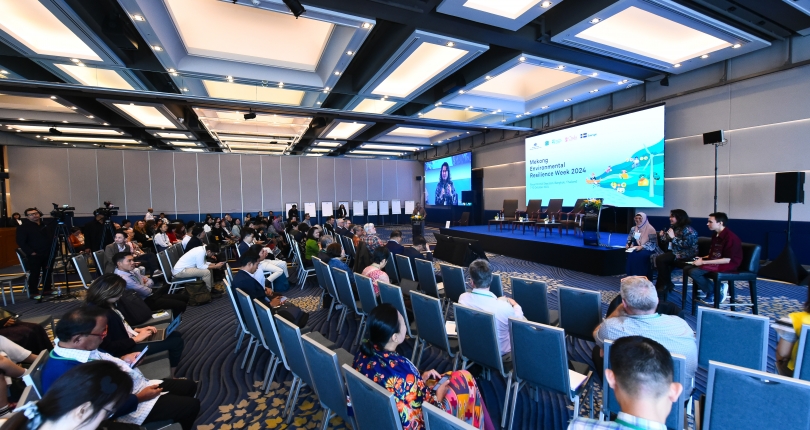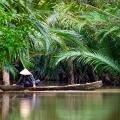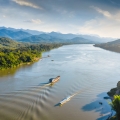A regional journalist reflects on the Mekong Environmental Resilience Week
From October 7 to 10, the Mekong Environmental Resilience Week 2024 was held in Bangkok, bringing together researchers, development partners, and policymakers to share knowledge and explore collaborations on pressing environmental challenges. Sen Nguyen, a former media grantee of SUMERNET, provides her insights from the event.
Last week, I let the Mekong hype consume me yet again and I'm telling you, no regrets.
Here are my highlights about the Mekong Environmental Resilience Week in Bangkok.
Renewable energy race
Mekong countries and ASEAN more broadly are catching up with their renewable energy (RE) dreams - In 2022, renewable energy accounts for 15.6% of ASEAN's total primary energy supply. Will they meet their 23% target in 2025? Seems ambitious. But let's see.
Hydropower continues to be a dominant RE source and a lot more capacity expansion has been planned. This is where the Mekong has been utilised, or frankly abused, for its energy generation capabilities.
Now those of you who have followed Vietnam's RE race know that surplus of energy has been an overload for the grid and headache for policymakers and investors. To put it simply, too many candies but no more pockets to hold them so they go to waste.
Jamie Pittock, professor at the Fenner School of Environment & Society, The Australian National University, suggested pumped storage hydropower as a solution to electricity storage. It's a technology that allows surplus RE to be held in a reservoir. It's super common in the US, for instance - check out this really cool animation to understand how it works.
But Jamie didn't mean building new hydropower dams but make use of existing reservoirs, which Mekong countries have a lot! Where are the possible sites for this tech? Here's a clue.
Vietnam appeared to be keen on the idea already, but unfortunately it is thinking about building completely new plants, including Bác Ái project. Chinese investors are also interested in building a plant using the same tech.

Nature-based solutions have been institutionalised on a global scale.
From the UN, EU to COP, even China have corporated this model into policies to mainstream it for widespread practice.
A nature-based solution works with, not against nature to and prevent harm and disruption. For instance, growing floating rice which can adapt with high levels of water in floodplains in the Mekong Delta, instead of building dykes to stop the river from entering rice fields to grow less flood-resistant species.
In Vietnamese, they are mô hình thuận thiên. It has been the hype for years since 2017, but it hasn't been incorporated into a national policy.
The idea is excellent but the question remains: how can these solutions be lucrative? For one thing, they need market expertise so agri products made from nature-based solutions can get to consumers.
It's an ethical dilemma to expect these solutions to be implemented by farmers so global climate commitments can be achieved, but they are the ones reeling from all the losses if nobody wants to buy their products. In reality, they are undercut by small-scale middleman merchants, (cò and thương lái in Vietnamese) who buy their produces for ten cents on the dollar.
Mekong & climate enthusiasts, thoughts?
The original blog was shared on Sen Nguyen's LinkedIn.
*Photo 1: Panel discussion titled "Reflections from selected policymakers and PIOs on the role of policy influencing organisations in WEC policymaking in the Mekong Region." Photo: SEI Asia.
*Photo 2: Sen Nguyen shares her insights during the group discussion "Strengthening WEC research and policy interfaces in the Mekong: emerging outcomes, challenges and steps to address these challenges." Photo: SEI Asia.
Info
This story is part of the following project
Mekong Thought Leadership and Think Tanks Network
Topic
Related people
You might be interested in
-
Grants open for research linking to policy action under Mekong Thought Leadership and Think Tanks Network Program
Mekong Thought Leadership and Think Tanks (MTT) Network Program calls for applications to its research-to-policy grants supporting evidence-based research that connects to practical solutions to challenges in the water-energy-climate nexus.
![Grants open for research linking to policy action under Mekong Thought Leadership and Think Tanks Network Program]()
-
Now open: fellowship opportunities under Mekong Thought Leadership and Think Tanks Program
MTT Program is opening a call for fellowships to be hosted in Cambodia, Lao PDR, Thailand, and Vietnam. The Program will award up to 13 high-quality entry- or mid-level professionals of all genders who are Mekong citizens.
![Now open: fellowship opportunities under Mekong Thought Leadership and Think Tanks Program]()
-
Call for 3rd batch applications: fellowship opportunities under Mekong Thought Leadership and Think Tanks Program
MTT Program is opening a call for fellowships to be hosted in Cambodia, Lao PDR, Thailand, and Vietnam. The Program will award up to 13 high-quality entry- or mid-level professionals of all genders who are Mekong citizens.
![Call for 3rd batch applications: fellowship opportunities under Mekong Thought Leadership and Think Tanks Program]()
 By
By 



 Read more about SUMERNET
Read more about SUMERNET
